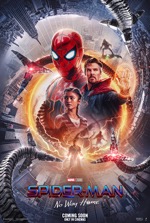March 2022
Spider-Man: No Way Home (PG-13)
24/03/22 22:59 Filed in: 2021

Starring: Tom Holland
December 2021
Warning! This is NOT a movie review. This is a critique of the film. Intended to initiate a dialogue, the following analysis explores various aspects of the film and may contain spoilers. For concerns over objectionable content, please first refer to one of the many parental movie guide websites. Ratings are based on a four star system. Happy reading!
Spider-Man: No Way Home has opened up a whole new narrative dimension for the MCU—the multiverse.
The multiverse concept certainly isn’t new; the earliest physics-related usage of the word can be traced back to a 1963 sci-fi story. Of course, the notion of alternate or intersecting realities has been extensively plumbed in sci-fi and fantasy books/TV shows/movies such as Star Trek (the “Mirror Universe” and TNG’s “Parallels”) and Sliders…among many other examples.
Sadly, screenwriters Chris McKenna and Erik Sommers barely scratch the surface of the infinite plot possibilities inherent in the multiverse concept. Indeed, such a wide open story device should’ve been expanded to far greater creative frontiers (reference Piers Anthony’s “Mode” series) than what’s presented in this pedestrian yarn: a teenage angst opener gives way to a bleeding heart middle which sets up the mash-up melee ending.
In an ironic twist, the story is dependent on Dr. Strange (Benedict Cumberbatch) but conveniently sidelines him for most of the film (for fear that he’ll upstage the kid running around in red tights, no doubt). Strange’s spell, destabilized by Spider-Man/Peter Parker’s (Tom Holland) multiple modifications to his incantations, opens a rift in space/time that allows the multiverse to come spilling into our plane of reality. Moral: alter the witch’s brew at your own risk. Corollary: beware the consequences of playing God.
What begins as a clever assemblage of heroes and villains from every previous Spider-Man movie (and what a treat it is to see Willem Dafoe, Alfred Molina, Jamie Foxx, et al. together on one set!) morphs into a rehabilitation experiment gone wrong (of course). The resulting protracted battle, which is all over the place and isn’t nearly as exhilarating as it should’ve been, features too many confrontations with too many characters and ends up being a sticky, tangled mass…much like a spider web.
While it’s fun to see all three Spider-Men (Tobey Maguire, Andrew Garfield and Holland) sharing screen time, the dialog is often hokey, jokey and repetitive (why do McKenna and Sommers keep harping on the fact that Maguire’s Spidey can naturally produce webs while Garfield and Holland’s wall-crawlers must manufacture theirs?). In many of these arachno-trio sequences, the opportunity for the heroes to learn from each other is eschewed in favor of frivolity and fan service. So much character development could’ve been mined in these scenes. What a whiff!
The one aspect of the movie that stimulated my gray matter was talk show host J. Jonah Jameson’s (J.K. Simmons) blustery commentary that bookends the film. At the beginning, with Spider-Man’s identity recently revealed, Jameson regards Parker as public enemy #1. At the end, after the timeline has been (mostly) restored, Jameson calls Spider-Man a coward for hiding behind a mask.
Not only does such choleric rhetoric illustrate the plight of a hero in the eyes of a fickle public, it accidentally stumbles upon a telling socio-political message: the media, it would seem, is complicit in inciting bigotry and hostility in any universe.
This movie caps off a trilogy where each installment has gotten exponentially worse. Many aspects of the movie are gimmicky, which is fitting since the entire plot is built on a gimmick (the multiverse). No Way Home squanders a promising premise and underserves a tremendously talented cast.
The word “Home” appears in the titles of all three Holland Spider-Man movies. If the next film in the series isn’t any better than this one, they should name it Just Stay Home.
Rating: 2 out of 4